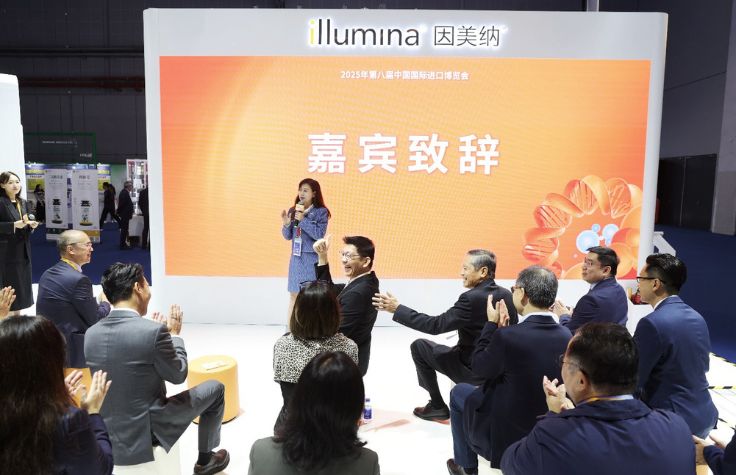Earlier this month at the 2025 China International Import Expo (CIIE) in Shanghai, Illumina introduced a suite of new technologies and signed several agreements to partner and manufacture locally, demonstrating its commitment to the country’s “In China, For China” strategy.
Over 922,000 people attended the annual event, where life science Illumina showcased their products and hosted panel discussions. This year marked Illumina’s sixth time participating in CIIE, and the company’s theme for the 2025 expo was “Innovating for Twenty Years, Sequencing for the Future.”
Ever since it began doing business in China in 2005, Illumina has steadily invested in the country. From introducing groundbreaking products to codeveloping research and clinical applications, Illumina has driven local innovation. Today, over 70%* of China’s clinically approved tumor NGS in vitro diagnostic applications are built on Illumina platforms.
“Illumina’s commitment to China spans two decades, and our vision is to advance genomics to transform health care for patients everywhere,” says Illumina CEO Jacob Thaysen, who met with the Chinese vice minister of commerce after the expo. “China is not only a strategic market but a vital contributor to global progress in life sciences. We appreciate the opportunity to engage in constructive discussions with the Chinese government. CIIE has become an important platform for introducing innovation and fostering collaboration. This year, we are proud to debut our latest multiomics solutions in China, empowering researchers and clinicians to accelerate discovery and drive genomic breakthroughs. Together, we aim to unlock the full potential of precision medicine and deliver meaningful impact for patients worldwide.”
Illumina’s Shanghai manufacturing site, established in 2022, began delivering locally produced sequencing systems and reagents to domestic customers in 2023. At CIIE, Illumina signed an agreement with a Shanghai development company to expand the capacity and scale of this manufacturing site. Illumina also signed strategic supply chain partnerships. These collaborations will drive greater integration and increase local production capacity.
“Localization has always been central to Illumina’s mission to better serve customers in China,” said Jenny Zheng, Illumina’s head of region for Greater China, during the signing session. “Today’s agreements mark another milestone in strengthening supply chain resilience and deepening the ‘In China, For China’ industrial landscape. We will continue accelerating full localization of products and solutions—enhancing manufacturing, quality, and compliance—to meet local needs. By leveraging our NGS and multiomics portfolio and working closely with partners, we aim to drive original innovation and advance precision medicine and biopharmaceutical development in China.”
During CIIE, two exciting new multiomic technologies made their China debut: First, the Illumina Protein Prep solution gives scientists a deeper understanding of proteomics and provides multidimensional insights across cancer and cardio metabolic and immunologic diseases. And second, with the 5-base solution, researchers can simultaneously detect genomic variants and DNA methylation in a single library preparation, sequencing, and analysis run, facilitating the discovery of novel biomarkers and advancing precision medicine.
The Illumina booth also showcased the locally manufactured MiSeq i100 Plus-CN (prototype) and NextSeq 2000-CN, and highlighted its reagent portfolio across oncology, single-cell sequencing, proteomics, infectious disease, and microbiology. Illumina also introduced products codeveloped with local partner Berry Genomics, including the NextSeq CN500, which supports applications in reproductive health, genetic disease testing, and scientific services, and the NovaSeq 6000Dx-CN-BG. This platform was just approved by China’s National Medical Products Administration (NMPA) in August and was introduced at CIIE.
To foster in-country relationships and collaborations, the company hosted several sessions and roundtable discussions on the future of precision medicine, multiomics data standardization, methylation-based clinical diagnosis, disease mechanism analysis, and more. Participants shared their insights to push research and partnerships and help build a more open, collaborative innovation ecosystem.
*As of August 2025, based on NMPA approval data.
